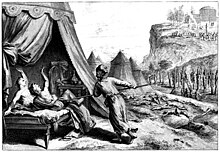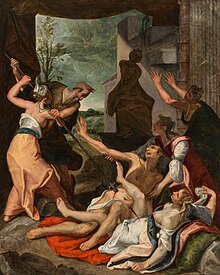Zimri (Hebrew: זִמְרִי, Zīmrī; lit. 'praiseworthy') son of Salu was the prince or leader of a family within the Tribe of Simeon during the time of the Israelites’ Exodus in the wilderness at the time when they were approaching the Promised Land. The Book of Numbers in the Hebrew Bible describes how, at Abila or Shittim, he took part in the Heresy of Peor, taking as a paramour a Midianite woman, Cozbi. For this sin, Phinehas, grandson of Aaron, killed them both by impaling them on a spear as they had sex (Numbers 25:6–15).[1]


The incident was then taken by the Israelites as a pretext for the War against the Midianites in Numbers 31.[2]
Interpretations
Judaism
According to a midrash (Tanhuma Pinhas 2.1; Sanhedrin 82b), Zimri was the same person as Shelumiel son of Zurishaddai.[3][4]
Islam
In Islam, Zimri appears under the name as-Sāmirī (الـسّٰامِرِي). Islam also assigns to him a major role in the earlier affair of the Golden Calf, which is not attested in the Bible, although this is only one of several theories for the man’s identity.[5] The Islamic account attributes to Zimri/Samiri many of the actions which the Hebrew Bible assigns to Aaron - thus exonerating the latter, Islam's prophet Harun, from involvement in the sinful worship of the Calf.[citation needed]
Christianity
According to the Revelations of Saint Bridget, after his death, Zimri's soul was condemned to hell (Book 7, Chapter 19).[6]
Later influence
In the deutero-canonical First Book of Maccabees, the zeal of Mattathias, leader of the Maccabean revolt, is said to be inspired by the zeal shown by Phinehas:
Thus he showed his zeal for the law, just as Phinehas did with Zimri, son of Salu. Then Mattathias cried out in the city, "Let everyone who is zealous for the law and who stands by the covenant follow me!"[7]
The Phineas Priests, a modern-day U.S. terrorist movement, believe the story of Phinehas and Zimri provides a divine mandate for committing atrocities against mixed-race couples; despite (argues Rees 2013[page needed]) the previous divine rebuke of Miriam in Numbers 12, for criticising Moses for marrying a “Cushite woman,” which confounds this reading.[8]